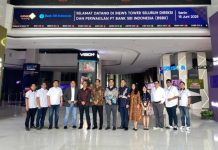By Pri Notowidigdo
“Am I ready for the interview?” You have undoubtedly asked yourself this question in the past prior to a job interview or maybe you are asking this question now as you prepare for an interview in the not too distant future.. No doubt, you have discovered that preparation is the key to success. The better prepared you are, the better your chances of being hired.
So how do you prepare for an interview? First make sure that you’ve got the right date, time, and venue. Get the correct name and title of the person you’re meeting. Decide how you should dress and appear so as not to clash with proper attire in the company . . . and so on. Basically, do a due diligence of what, where, and when.
The how of the interview, though, is what can make you or break you. This is where the element of personal chemistry, or shared values, comes into play. You don’t need to alter your identity for the sake of an interview. The best thing you can do is to relax, and rely on your empathy, common sense, and forethought as the best means of generating personal chemistry in the interview.
Empathy can be used effectively any time you want to exchange ideas with another person. When you think about it, that’s exactly what an interview is: an exchange of ideas with another person. “What are the thoughts, feelings, or attitudes of the person interviewing you?” Only by listening carefully and asking questions will you find the real needs of the interviewer. There’s little point in selling yourself unless you first learn what the interviewer wants to buy.
The success of your interview will depend on your ability to discover needs and empathize with the interviewer. You can do this by asking questions that verify your understanding of what the interviewer has just said, without commenting or expressing an opinion. By establishing empathy in this manner, you will be in a better position to freely exchange ideas, and demonstrate your suitability for the job.
In understanding the needs of the employer, ask meaningful questions by:
-
Creating dialogue, which will not only enable the two of you to learn more about each other but will help you visualize what it will be like working together once you’re hired;
-
Clarify your understanding of the company, the job objective, and responsibilities;
-
Indicate your grasp of the fundamental issues facing the organization;
-
Demonstrate your ability to probe and ask questions beyond the superficial; and
-
Challenge the employer to reveal his depth of knowledge, or commitment to the job and organization.
Your questions should always be slanted in such a way as to show interest, or an understanding of the employer’s needs, e.g. “What are the most important issues facing your department?” This will give you a sense of the company’s goals and priorities and indicate to the interviewer your concern for satisfying the company’s objectives.
In addition to empathy, keeping in mind other critical elements will ensure a successful interview. Your enthusiasm in the job is a critical element reflecting motivation for both you and your employer. What you love to do will demonstrate your technical interest. How you project confidence can instill the interviewer’s confidence in you as long as it does not border on arrogance or aggressiveness. Finally, keeping yourself focused on what’s happening during the interview will keep the discussion meaningful. Being aware of these elements will influence the way your personality is perceived, and will affect the degree of rapport, or personal chemistry you will share with the employer.
Since the interview also involves the exchange of tangible information, make sure that you also:
-
Present your background in a thorough and accurate manner;
-
Gather data concerning the company, the industry, the position, and the specific opportunity;
-
Link your goals, interests, and abilities with the company’s needs in the mind of the employer; and
-
Build a strong case on how hiring you can benefit and provide added value to the company.
The more everyone knows about each other, the more potential you’ll have for coming to a mutual understanding and getting an offer of employment.
Think of the interview as a process rather than an event. In this way, you will then come to regard it as a unique opportunity to exchange ideas and find a common ground for future cooperation either as an employer . . . or even as a business partner.
Pri Notowidigdo
The Amrop Hever Group
Global Executive Search
Bapindo Plaza, Citibank Tower, 14/F
Jl. Jend. Sudirman, Kav 54-55
Jakarta 12190, Indonesia
E-mail: prijkt@cbn.net.id , jakarta@amrophever.com
Web-site: www.amrophever.com






